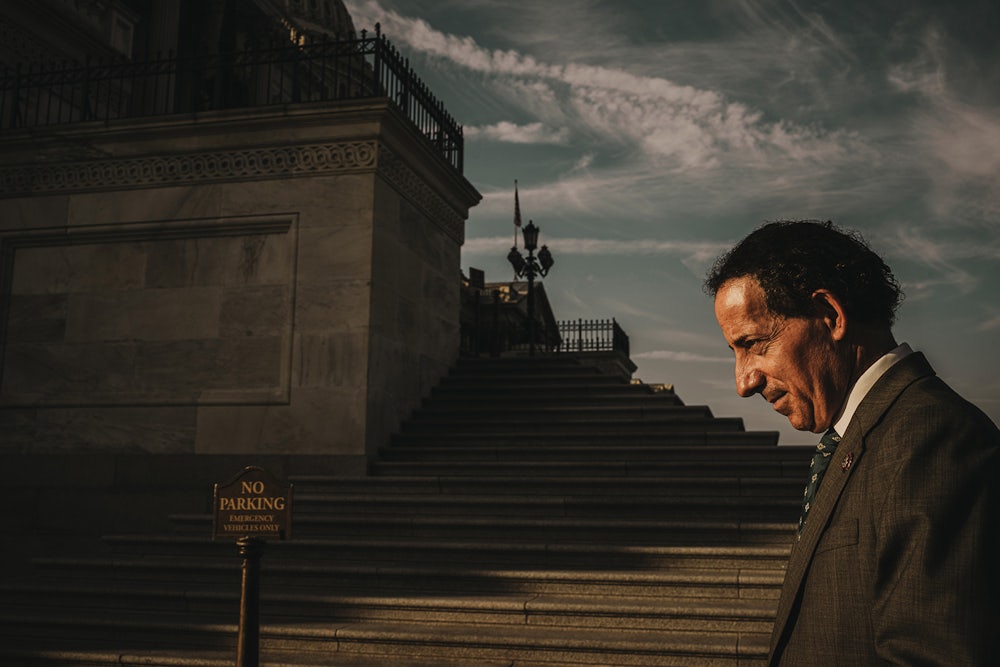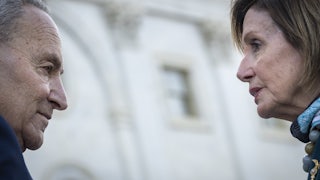It’s rare when citizens develop a genuinely emotional tie to a member of Congress, but that’s exactly what happened in 2020 and 2021 with liberals across the country and Maryland Representative Jamie Raskin. First elected in 2016, Raskin was quick to show America his whip-smart intelligence and his constitutional chops. But when people got the news that his son, Tommy, had committed suicide—and then, just days later, that one of his daughters had feared for her life during the January 6 insurrection—Raskin, who continued to show bravery and commitment to principle throughout, became a hero of a sort rarely seen.
In this profile, which appeared in conjunction with Raskin’s book, the congressman spoke exclusively to editor Michael Tomasky about what January 6 was like for him and his daughter, about his fears (and hopes) for the republic, and about his son. If you read that section of this profile and are unmoved, you are in a small minority.
—Michael Tomasky, editor, The New Republic
Most every night, just after he slips into bed, Jamie Raskin picks up a volume of the collected works of Shakespeare, thumbs through it, and reads a few pages before sleep takes him. He is not, he admits, a big reader of fiction; doesn’t have the time. But he loves his Shakespeare, he told me one October night as we sat in his kitchen. Two days later, I asked him for a quote from the Bard that sums up our times. He squinted his eyes and looked downward.
“I mean, um … ‘Hell is empty and all the devils are here’?” He smiled cheekily at the line, spoken by Ariel in The Tempest, referring to sailors jumping off a burning ship; no elaboration was needed in either of our minds about who these “devils” of today might be. Then he gave the matter more serious thought. “I think about Macbeth all the time…. Lincoln was obsessed with Macbeth, and so was John Wilkes Booth, who had played Macbeth.” Contemplation of Macbeth led him to settle on his more considered answer: “I’ve thought a number of times of ‘If it were done when ’tis done, then ’twere well it were done quickly.’”
The line opens Macbeth’s soliloquy toward the end of Act I, as he contemplates murdering King Duncan. The soliloquy showcases not just Macbeth’s malevolence, but his awareness that he may be setting off a series of events that he will not be able to control: “we but teach bloody instructions which, being taught, return to plague the inventor.” It is from this speech that we get the phrase “poisoned chalice,” from which the instigator of dark events will himself one day be forced to drink.
Donald Trump, who has poisoned our republic’s chalice arguably more thoroughly than any other figure in U.S. political history, has not been forced to drink from it. But then, we’re only (alas) in Act III of the Trump tragedy. The climax lies ahead. Whether Act V ends with Trump victorious, the republic in ruins around him, or with Trump vanquished and the republic saved and vindicated, remains to be seen. But if the latter, history may well note that no one—save, obviously, Joe Biden and his campaign team—did more to secure that end than Jamie Raskin.
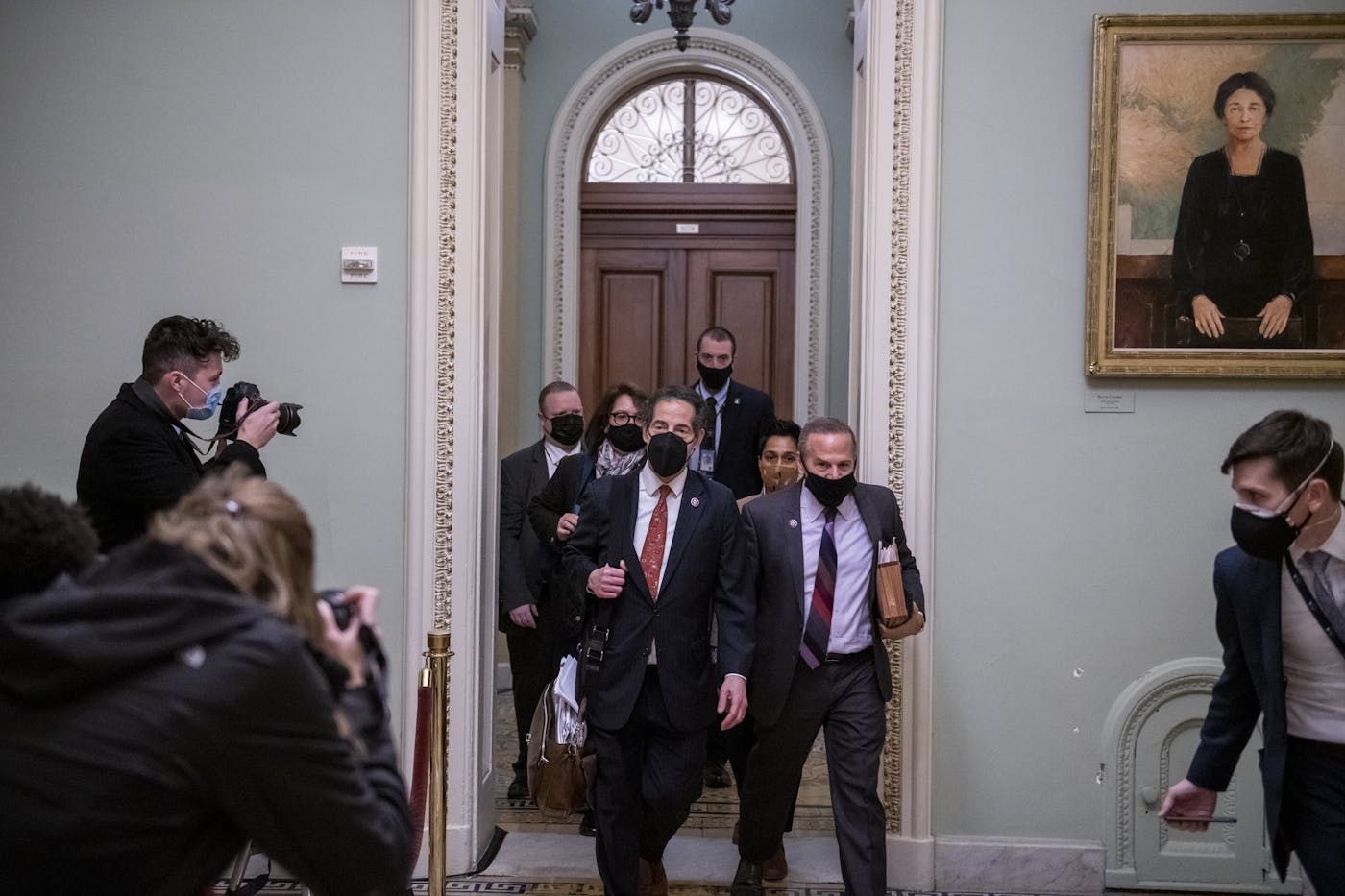
Yes, he’s “just” a congressman, serving only his third term; in days gone by, when the Old Bulls laid their mighty girths across the House of Representatives, a third-termer like Raskin would still be an unknown, being told (probably by some segregationist) to wait his turn. But the modern Congress makes a bit more room for talent to rise to the top, and so Raskin rather quickly became a star. As a member of the Judiciary Committee, he questioned Robert Mueller; later, during the first Trump impeachment, the Ukraine one, his arguments about the Founders’ rationales for impeachment reflected his history as a constitutional law professor and scholar. It was clear then—this was late 2019—that the guy had some chops. So many members’ questions during main-event hearings are really ill-disguised speeches, delivered for editing and dropping into campaign ads; with Raskin, you could tell he was actually going somewhere. But those performances were mere prelude to the second impeachment, over the January 6 insurrection, when Speaker Nancy Pelosi put Raskin in charge. He and his team of managers are widely considered to have presented a masterful case against Trump and defense of the rule of law, and indeed, even though the Senate did not convict Trump, the vote was the most bipartisan Senate support for conviction in the country’s history.
All that unfolded just weeks after the suicide of his only son, Thomas Bloom Raskin, whose lifeless body Jamie discovered in their home on the last morning of 2020. Tommy’s death was shattering for Jamie and wife Sarah and their two daughters, Hannah and Tabitha. And it was hardly less shattering for the army of admirers Raskin, whom I first met in 2019 when I interviewed him for a documentary film, had amassed through three decades of teaching, organizing, campaigning, legislating, and handing out his business card, the one with his personal email address on it, to any constituent who approached him. To watch him make those icily logical yet passionately democratic opening and closing arguments knowing that he had recently buried his 25-year-old son—and then, the day after burying him, lived through the trauma of January 6 with daughter Tabitha and son-in-law Hank Kronick, Hannah’s husband, who both literally thought they were going to die—well, it was to witness an astonishing act not just of personal courage but of civic ardor. California Representative Adam Schiff, who chaired the Ukraine impeachment, told me that as he and Raskin walked through the Capitol’s Statuary Hall to have lunch together before the second trial, Schiff had asked how he was holding up; he wanted to know whether the memory of his son would be a strength to him: “And he said that it would be, that Tommy loved the Constitution every bit as much as he did.”
Now, Raskin is out with a book, Unthinkable, which chronicles the impeachment trial, some parts of Raskin’s background, and Tommy’s death (and his life). The congressman is, in addition to everything else, a really good writer. The blow-by-blow of January 6 is riveting. The passages about his son, and his own pain, are sometimes searing: Raskin writes that he had always assumed he’d be cremated, but after they buried Tommy, he and Sarah bought the plots straddling their son’s, so he “could be buried next to [his] boy for eternity,” he explains, so “we could talk philosophy and politics and make jokes forever, starting as soon as I got there to be with him—and sooner rather than later, I hope, I remember adding darkly in my mind.”
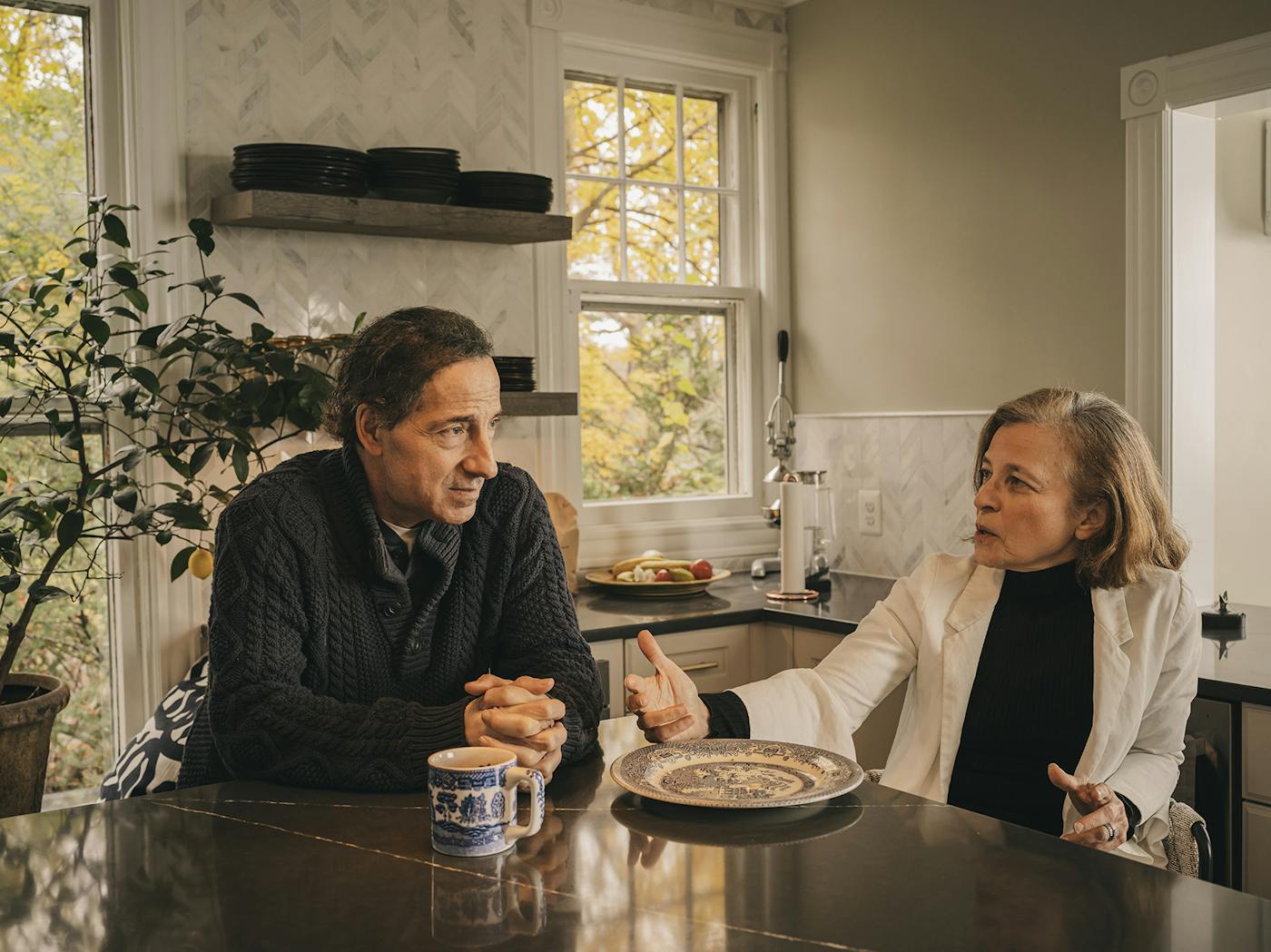
In recent months, he has crawled out of that abyss to some extent, in no small part because he knows he has a job to do, a job his son would have wanted him to do, a job he carries on now as a prominent member of the House Select Committee to Investigate the January 6th Attack on the United States Capitol. That job, put simply, is to defend the Constitution he loves, even as he grapples with its, and its authors’, many complicating downsides (not least the Electoral College, and, of course, slavery). “My mother refers to him as ‘that Constitution guy,’” Yvette Lewis, the chair of the Maryland Democratic Party, told me. I think maybe it’s not an accident that the fates saw to it that Raskin and Donald Trump were both elected to federal office on the same night in 2016: that just as certain dark forces sent to Washington democracy’s destroyer, a man who would have appalled the Founders with his dishonesty and proud ignorance and naked self-dealing, other forces sent democracy’s defender—an admirer of Thomas Paine and William James and the social movements that have pushed this country to live up to its stated principles, an utterly incorruptible public servant, the epitome of the kind of person the Founders envisioned running our government. Said Vermont Representative Peter Welch: “There’s a moral character to him. You just feel you want to be like Jamie.”
There are ministers in Congress, and physicians and dentists and software executives and airline pilots and much else, but there is only one professor of constitutional law. So, on the morning of January 6, right after Tommy’s funeral, Jamie Raskin stepped out onto the front porch of his home in Takoma Park, Maryland, the Washington, D.C., suburb where he lives with Sarah and their two dogs, ready for work. The front porch, he writes in Unthinkable, resembled “one of those makeshift memorials on a highway to someone lost in a car accident”: flowers, letters, notes, packages, stacks of books. The trauma of his tragedy was everywhere around him. But it was January 6: an important day. He had to be there. “The public servant is there in the midst of this deepest, darkest tragedy that any family can really imagine,” marveled his friend Mark Medish, co-founder of Keep Our Republic, a nonprofit group. Tabitha tried to convince him not to go, but he said it was his duty. Deciding he shouldn’t be alone, Tabitha came along, as did his son-in-law, Hank.
Julie Tagen, Raskin’s chief of staff, drove him to the Capitol. For blocks along North Capitol Street, nothing unusual. Then, south of the New York Avenue intersection, about a dozen blocks north of the Capitol, tremors: “MAGA hat–wearing protesters flowing in from all directions toward the Capitol,” Raskin recalls in his book. Farther down, DON’T TREAD ON ME flags, a Confederate battle flag, a woman with a sign that said FUCK YOUR FEELINGS. They made it to the south side of the building, the House side, where the three House office buildings sit. Raskin’s office is in Rayburn. He sat down and worked on the short speech he was to give to rebut Republican challenges and argue that the election was over. Around 11:45 a.m., shortly before Trump started speaking at his rally, Raskin and Tagen headed over to the Capitol, where they were to meet Tabitha and Hank. They waited in a room numbered H-219, in the southeast corner of the building, near the House floor. It’s the Capitol “hideaway” office of the majority leader, who happens to be fellow Marylander Steny Hoyer.
Everyone knows what happened next. On a gorgeous day in October when the House was in recess, Raskin took me to the Capitol and walked me through, as nearly as could be approximated in a near-empty building, what his January 6 was like. The House chamber that you see on television is in the south side of the Capitol, on the second floor. It is surrounded by four hallways. From the vantage point of the chair looking out, on the right-hand or northern side is an entrance to the floor that is the common reporters’ “stakeout” for Democrats, because that entrance leads to the Democratic side of the chamber. On the left-hand or southern side is the entrance that leads to the Republican seats. In the middle, in the corridor nearest the Rotunda, is another entrance; this is the one presidents use for State of the Union addresses. And opposite it, behind the chair, is a hallway called the Speaker’s Lobby—more ornate than the other halls, with three chandeliers and about 16 portraits punctuating the 80-or-so-foot-long corridor, the speaker’s office tucked in there behind the hall. At all entrances now, because some Republicans have threatened to carry their guns into the chamber, are metal detectors.
Raskin was on the floor that day. Other members who weren’t so central to the proceedings were up in the visitors gallery, which is accessed through the third floor. Before 1 o’clock, Jamie, Tabitha, and Hank were together in Hoyer’s hideaway. “Steny was really nice because he offered me this office basically like for that week, because he knew that I was being mobbed by people, reporters and stuff,” Raskin recalled. “And then he said, ‘If you’re going to bring the girls or whatever, you can use this office.’” Sometime around 1 p.m., Raskin went to the floor, and guards escorted Tabitha and Hank up to the gallery.
Right around then, two things happened. Mike Pence released his letter affirming that he would certify the count, which was the first moment that Democrats understood that the election would not be stolen; but at the same time, the first rioters breached the barricades on the Capitol’s west front, facing the mall. At 1:10, Trump finished his speech, and a much larger crowd marched toward the Capitol. A short time later, Raskin delivered his speech; some instinct told him not to utter the sentence that goes, “This is the peaceful transfer of power we celebrate and a model for a grateful world.” He sat down. Tragicomically, the next speaker was Lauren Boebert, the QAnon devotee who the people of Colorado’s 3rd Congressional District have decided belongs in the House of Representatives. At right around 2 p.m., Raskin got his first sense that something was amiss from his friend Alyssa Milano, the actress, who was watching it all unfold on television and texted him to ask if he was safe. At 2:09 came another text, this one from the Capitol Police: “All buildings within the Capitol Complex, Capitol: External Security Threat No Entry or Exit.” The text advised members to “shelter in place” and “stay away from exterior windows or doors.” Members started getting texts with photos of the rioters. Liz Cheney, to whom Raskin has grown close, recalled to me: “Jamie and I were both sitting on the aisle in the chamber, he was on the Democratic side, right on the aisle, and I was on the Republican side, right on the aisle. And as the reports were coming in of the mob, getting closer to the chamber, and we were being given directions about what to do, there was a moment where Jamie was looking at his phone, and he sort of looked up from his phone, and he said, ‘Oh my God, Liz.’ And I said, ‘What is it?’ And he said, ‘There’s a Confederate flag flying inside the Capitol.’”
Tabitha and Hank had been up in the gallery, but at some point they left. Abigail Spanberger, the Democratic congresswoman from Virginia, remembers a moment when Raskin looked up for them and didn’t see them. “The look on his face as they were trying to contend with what was happening on the floor, and it wasn’t immediately apparent where his daughter was, was pretty extraordinary,” she told me. Raskin called Tagen, and she said she was with Tabitha and Hank in H-219. On that October day, Raskin showed me the room—the three locks on the door, the chair they slid in front of the door as they listened to the chaos, screaming, and a few gunshots just on the other side of it (this is also very near where the QAnon-believing rioter Ashli Babbitt was shot, at the entrance to the Speaker’s Lobby). The windows look out on the west front, so they had a skybox seat from which to observe the hundreds of rioters storming the Capitol.

The three of them stayed in H-219, a room I’d say is about 10 by 20 feet or so, for around three hours, with no food and only some orange juice from Hoyer’s small refrigerator. Once the rioters were dispersed, members were led in large groups down to the basement and eventually back to the House office buildings. The experience was terrifying. “Nobody took out an AR-15 and started mowing everybody down, but that’s what everybody was thinking was going to happen,” Raskin said. And beyond being terrifying, it was horrifying. After he was reunited with Tabitha, Hank, and Julie, Raskin went on C-SPAN to assure the country that the certification would continue, but he stopped to note what a hideous moment this was: “Attacks on the Capitol didn’t even happen during the Civil War. You have to go back to the War of 1812 to find something like this, and that was a foreign power that attacked us. There was no Confederate attack on the Congress. So we’re going to complete the count if we have to stay here all night or even all day tomorrow. We’re going to swear in Joe Biden and Kamala Harris on January 20th. This violence is intolerable, lawless, and unacceptable, so we have to finish the job we were sent to do.”
If Raskin took January 6 a little more personally than most members, it was partly because of his respect for our democratic customs—and partly because the nation’s capital is his hometown. He was born in 1962 in George Washington University Hospital; his Takoma Park home is less than 10 miles away. (His full name is Jamin Ben Raskin; his parents named him after his paternal grandfather Benjamin, who’d been a plumber, playfully reordering the syllables of the first name.) “My dad used to say that everybody wants to fly like a bird or just stand like a tree, and some people are bird people, and some people are tree people,” he said. “I’ve always been a tree person.”
The dad in question was Marcus Raskin, a formidable intellectual who would go on to help found the Institute for Policy Studies, which at its peak was Washington’s top left-leaning think tank. At the time of Jamie’s birth, he was on staff at Kennedy’s National Security Council. “His first day of work was the Bay of Pigs,” Raskin recalled. His mother, Barbara, was a journalist and novelist; her most successful novel, Hot Flashes, spent five months on The New York Times’ bestseller list. His maternal grandfather, Samuel Bellman, was the first Jewish person elected to the Minnesota state legislature (from the St. Louis Park area, famed as the home of Al Franken, Norm Ornstein, Thomas Friedman, and the Coen brothers).
Jamie Raskin grew up in the Adams Morgan neighborhood of D.C., in a house full of politics, books, art, intellectual thrusting and parrying. Dr. Benjamin Spock popped around, and George McGovern and Ralph Nader. As if that weren’t enough, Marcus was also a concert-level pianist. “He taught Philip Glass how to play the piano, which a lot of people say explains everything you need to know about Philip Glass,” Raskin joked.
In 1968, during the Vietnam War, Marcus, who died in 2017, was indicted along with Spock and others for illegally counseling young men to evade the draft. He was acquitted, but the indictment played “a defining a role in the formation of my political consciousness,” Raskin said. It was a time of turmoil in Washington. Jamie was one of two white students in his public school class, and things got a little dicey at school for him after the 1968 riots, so his parents moved him against his wishes to Georgetown Day School, founded in the 1940s as the district’s first integrated school. He went off to Harvard when he was just 16. He laughed: “That was a form of subtle child abuse to get rid of me. When I got there, everybody was off getting drunk and losing their virginity. And I was looking for the chess club with my Star Wars lunch box.”
After Harvard Law and a short stint as an assistant attorney general in Massachusetts, he decided he wanted to teach, and, lo and behold, he landed a job at the American University Washington College of Law in the very town in which he grew up, where he taught until he joined Congress. Sarah eventually became a staffer on the Senate Banking Committee. Hannah was born, then Tommy, then Tabitha. Meanwhile, Jamie was involved in politics both national and local. (Takoma Park is an affectionate punch line on the left, akin to the People’s Republic of Santa Monica.) They were a close, loving family (“My sister says that the Raskins say ‘I love you’ when they call 411,” he told me) living a great life. Then suddenly, in early middle age, Raskin decided to enter politics. “I didn’t have any kind of grand plan, and I wasn’t sure I wanted to do it, but when the moment presented itself, I knew it was the right thing for me to do,” he told me.
The moment took the form of a seat in the Maryland state Senate. He decided to challenge a longtime incumbent, Ida Ruben, who had been wobbly on opposition to the Iraq War. It was 2005; the race was the next year. Montgomery County today is as liberal as the Upper West Side. But it wasn’t like that then. From 1987 to 2003, the county was represented in Congress by a moderate Republican, Connie Morella. David Moon, who was Raskin’s campaign manager, recalls that the campaign took a poll, “and I remember the poll results came back, and it was like 50–50 on the death penalty, 50–50 on the ICC, a controversial highway project.” That argued for caution. But Raskin, said Moon, “was like, no, that doesn’t make sense to me. That doesn’t make sense for how we’re going to win, or why I’m gonna run.” He was the underdog. Ruben outspent him two-to-one. He won by two-to-one. “He has a touch,” said Hans Riemer, a Montgomery County Council member. “He makes people feel great, and you could see in his candidacy, he exudes enthusiasm and optimism and love and excitement.”
His friend Brian Frosh recalled that when Raskin joined him on the state Senate’s Judicial Proceedings Committee, landmark bills on marriage equality and gun safety were passed—measures Frosh said he couldn’t get through until Raskin joined the fight. Raskin did two other big things as a state senator. First, his constituent work was ferocious. Takoma Park Mayor Kate Stewart said that Raskin can remember where her children go to college and what they’re studying. Second, he made it a point to groom diverse successors. Moon, now a state legislator, is Asian American. Ditto Susan Lee, now in the state Senate. And state Senator Will Smith, who is Black, holds Raskin’s old seat. Aside from the legislation, Smith told me, “For the district and for the county, his legacy, if you look at [District] 20 now, it’s the most diverse legislative delegation in the county.” And Lee told me that Raskin fought hard against Trump-era policies that cost some Americans of Chinese descent their jobs in the STEM sector and held a hearing on the matter.
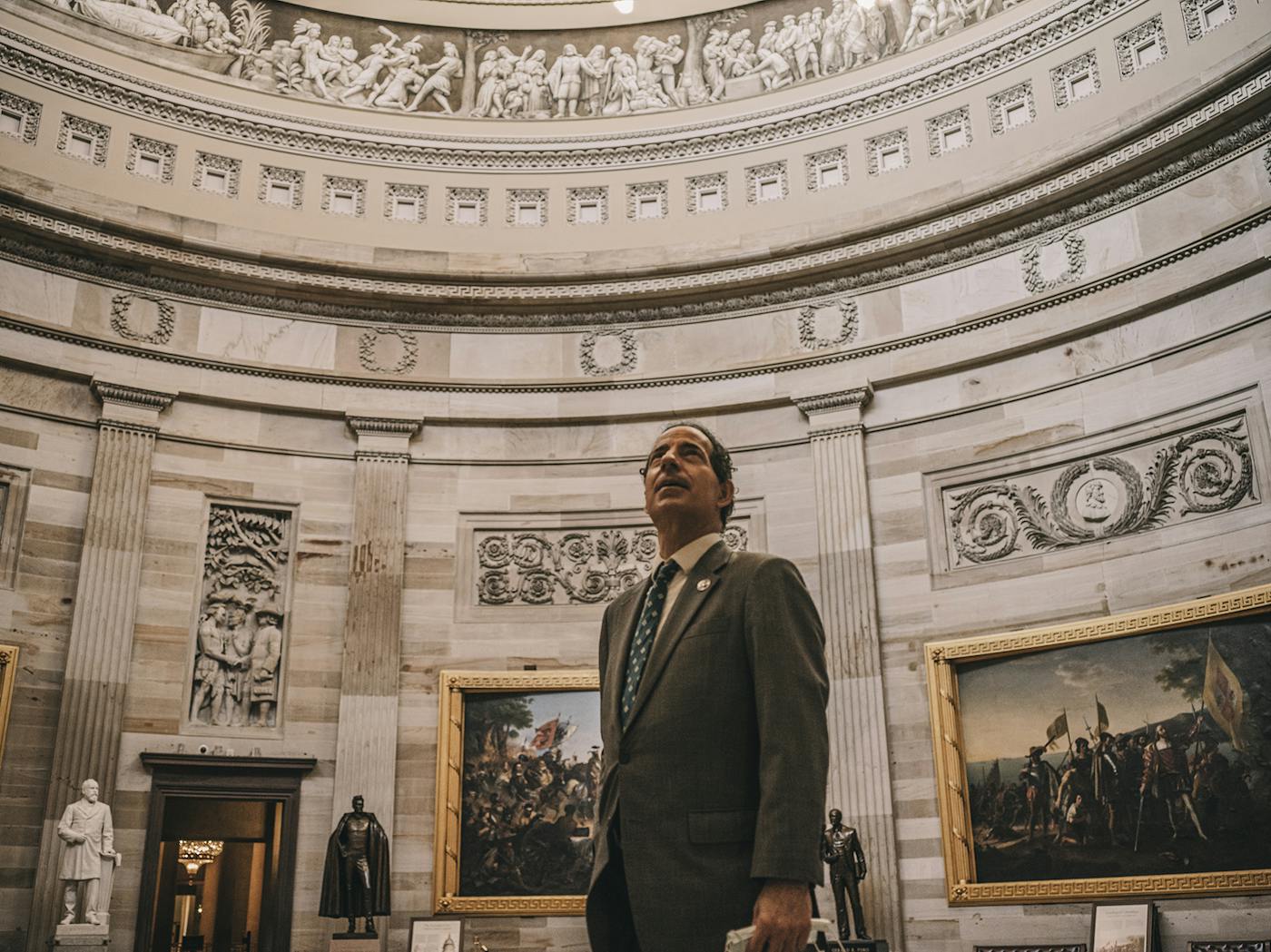
In 2015, Chris Van Hollen, the Democratic representative for Maryland’s 8th Congressional District, called Raskin to let him know he would be running for Senate. Raskin decided on the spot to run for Van Hollen’s seat: “I said, ‘Not only do I support you, Chris, I’ll run for your seat.’ And that was my full deliberative process.” Again, he was the underdog in a crowded Democratic primary. The favorite was Kathleen Matthews, a well-known and well-liked local TV newsperson, and wife of then-Hardball host Chris Matthews. There was also David Trone, a liquor store magnate who spent millions, and six other candidates. I remember thinking at the time that, because of Matthews’s notoriety and Trone’s money, Raskin might finish third. He got 34 percent to Trone’s 27 and Matthews’s 24. He cruised to victory in the general, but it was of course a bittersweet moment, because Trump won: “It could have been one of the most enjoyable nights of my life, but it became a really despondent night.”
The first two years, in the minority, were tough. But after the Democrats took the House in 2018, Raskin got a subcommittee chair right in his wheelhouse, the Subcommittee on Civil Rights and Civil Liberties of the House Oversight and Reform Committee. The presidential election came; Biden won it, and all of Trump’s despicable-but-hapless legal maneuvering failed. On December 15, the electors met and validated Biden’s win. As 2020 drew to a close, Raskin had many reasons to feel optimistic. On the night of December 30, it was just him and Tommy at home. They watched an episode of Family Guy. Tommy decided to turn in early, so Jamie hugged and kissed his son good night, and told him he loved him.
Tell me, I finally worked up the gumption to say at our fourth meeting, about Tommy.
It was a glorious fall Saturday afternoon. He had just finished speaking and glad-handing at an outdoor event in Friendship Heights, a posh-ish Maryland neighborhood right on the district line. We walked down the street to an Italian restaurant I like. It was around 3:30, so not crowded; some of the outside tables were occupied, but Jamie and I were the only people in the inside dining room. I ordered some brussels sprouts. Jamie—like his son, a vegan, but, unlike his son, a vegan who occasionally sneaks some goat cheese—stuck with orange juice, his go-to beverage.
He took about 30 seconds to gather his thoughts. “Tommy,” he said, “was someone whose thoughts and feelings were literally too good for the world as it is.” Most of us, he explained, can read about the war in Yemen or the famine in Sudan and feel it for a few moments and then go on with our day. “That’s not what Tommy was like,” Raskin said. “These things stayed with him.”
At the same time, Tommy was both brilliant (he was in his second year at Harvard Law) and funny. He made everyone laugh. He loved Sacha Baron Cohen, especially Da Ali G Show—on which, as fate would have it, Marcus Raskin once appeared, making his grandson proud, because he cottoned on to the hoax of it quickly. He wrote poetry, long poems, which he could recite by memory over up to half an hour, his father said. He was repulsed by the slaughter of animals, which he believed inured us to violence more generally; this is the topic of one of his poems of which his father is most proud, called “Where War Begins.” He was intellectually restless. In the book, Raskin tells the story of a time when Sarah and Tommy were driving from Maryland to Boston while Tommy was in college. Around Baltimore, Tommy finished reading an academic’s article to which he objected, concerning animal rights. He emailed the professor to challenge him to a debate. The professor emailed right back, saying he wouldn’t debate anyone who wasn’t published in a peer-reviewed journal. Tommy asked his mother what a peer-reviewed journal was. Still in the car, he wrote an essay, submitted it to various online peer-reviewed journals, got it accepted by one, and scheduled a debate with the professor. But it was around that time, in his early twenties, that depression started to consume him.
In the book, Raskin calls Tommy his “intellectual soul mate,” and he reflects, as any parent would, on what more he could have done. He told me at the restaurant: “He had said to me, maybe just a few weeks before, that he didn’t know if he could ever be happy. And I immediately started talking too fast and saying, ‘When you’re happy, you can’t imagine being sad. When you’re sad, you can’t imagine being happy. When you’re healthy, you can’t imagine being sick. When you’re sick, you can’t imagine being healthy; that this is just a passing thing and so on.’ And it was a lot of words. And I think he just looked at me, and when I look back on it now, I think maybe he had already made up his mind.” Tommy left a note, which the police found: “Please forgive me. My illness won today. Look after each other, the animals, and the global poor for me. All my love, Tommy.”
Raskin paused. He was close to tears. I asked about his daughters. He started telling me about them; a couple of minutes later, as if on cue, Hannah, who now lives in Nevada with husband Hank, called. He perked up, told her he loved her, and turned back to our conversation. “It’s been hard for the girls,” he said. “And hard for all of Tommy’s cousins. If something happens like this, you’re so drowning in despair and agony that you become very self-referential. And as I’ve been able to catch my breath a little bit, it’s only now that I’ve begun to recognize how devastating it was for everybody else.”
He paused again, and stared down at the table. Again, he was holding back tears. I felt like one of those awful television reporters who holds a vigil on the front lawn of the home of grieving parents, waiting for them to step outside for the newspaper so they can ask them how they feel. Frank Sinatra’s indifferent rendition of “For Once in My Life” oozed out over the sound system. I apologized and suggested we change the subject. He stared down at the table again and whispered: “There is no other subject.”
Earlier that day, at the Friendship Heights event, I observed roughly the ten-thousandth person come up to him in my presence to thank him, and I mean really thank him, for what he’s doing for democracy and tell him how proud they are to be his constituent. And I said to him: You know, Jamie, I notice that no one ever comes up to you to complain about their Social Security or gripe about potholes. Well, he instantly replied, that’s because I have such a great district staff, led by Kathleen Connor, whom I must insist you speak to (I did, and she’s great; she’s known Raskin since her son Jack and Tommy were in kindergarten together). I said, I’m sure that’s true. But somehow I don’t think that’s really the reason.
These next three years will test our democracy in ways it hasn’t been tested since the 1860s, or maybe ever. The scenario is pretty straightforward. The Republicans retake the House in the midterms. Immediately, any chance of Biden passing meaningful legislation is dead, but that’s the least of it. The GOP will launch hearing after hearing, issue subpoena after subpoena; they will find some flimsy rationale on which to impeach Biden, and they will stretch it out as long as possible. Trump will run—as Raskin put it, “for psychological, political, and financial reasons”—and he will be the GOP nominee, Raskin has little doubt. Assuming Biden seeks reelection, the election will probably be close, because elections just are these days. If Biden wins by a matter of several thousand votes in a few states, as he did in 2020, the Trump machinery will kick into gear to steal the election. Republican election commissioners and state legislators and even some governors will put forward pro-Trump electors. The House of Representatives will not vote to certify Biden’s win in January 2025, which will toss the election to the House, which will make Trump president. (When a presidential election gets thrown to the House, under the Twelfth Amendment, the vote is by state delegation, so North Dakota has the same voting power as California; Republicans now control, and will likely in 2025 still control, a majority of state delegations, and Liz Cheney will probably be gone, meaning that Wyoming will go pro-Trump.) For the second time in the history of the United States, the other time being 1824, Congress will have installed as the president a candidate who did not win a plurality of votes in either the Electoral College or the popular vote.
“Donald Trump has now converted every formerly ministerial step of the process into a moment for partisan rumble and contest,” Raskin told me. “So when we’re talking about the certification of the state popular vote, the governors’ certification of the electors, the electors meeting, and then the January 6th joint session receipt of the electors … all these phases of the process have now been turned into yet another opportunity for partisan combat.” There is no question in Raskin’s mind that this is what Trump and his supporters will try to do.
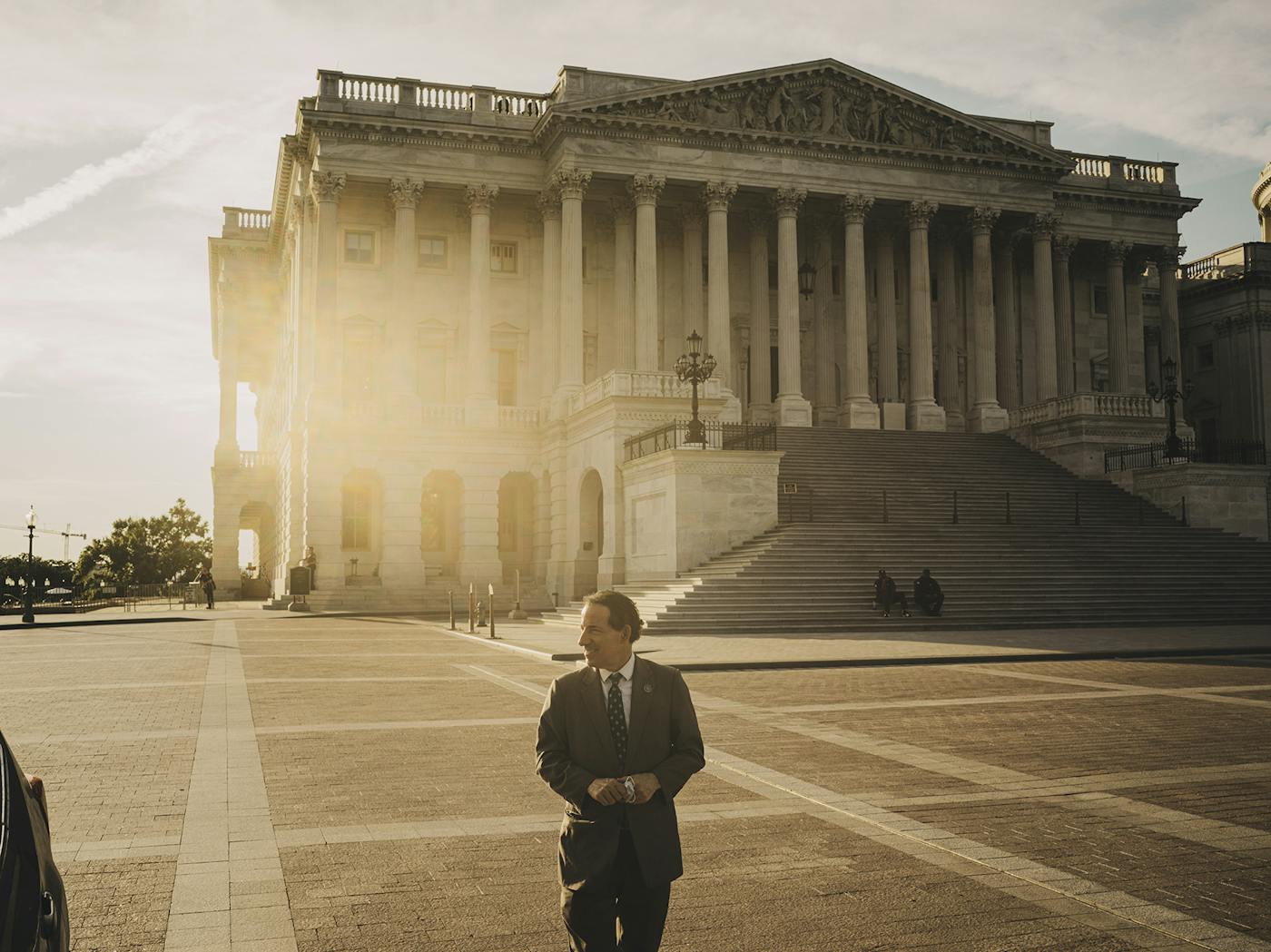
The select committee on January 6 ties in directly here. Aside from trying to get to the bottom of who did what before and on the infamous date, Raskin wants the committee to try to take steps to safeguard democracy from attack by Trump or any future Trump wannabe. “Our select committee, I believe, should do whatever it can to reform the Electoral Count Act, to make it conform as much as possible to the popular will,” he said, referring to the 1887 act that spells out—confusingly, ambiguously, contradictorily—the presidential election certification process.
That obviously won’t be possible if Republicans retake the House. In the majority, the GOP will likely do all it can to subvert democracy and preemptively make people distrust the electoral process. In that case, Raskin will become an even more important voice in the Democratic Party than he is now. As his friend Representative Don Beyer of Virginia put it: “I think we all recognize that the most eminent constitutional scholar in the Congress is Jamie.”
Toward the end of my reporting for this story, I contacted four scholars to ask them if they knew of a quote from James Madison or Thomas Jefferson—Raskin’s favorite Founders, after Thomas Paine—that summed up Jamie Raskin. Jeffrey Rosen, who runs the National Constitution Center, invoked Federalist 57, perhaps written by Madison: “The aim of every political constitution is, or ought to be, first to obtain for rulers men who possess most wisdom to discern, and most virtue to pursue, the common good of the society.” Raskin, Rosen emailed me, “is exactly the kind of representative Madison had in mind, one governed by reason rather than passion, and devoted to the public good rather than to partisan interests.”
William Antholis, a political scientist who heads the Miller Center at the University of Virginia, quoted from a letter Jefferson wrote in 1822 to William T. Barry: “Very many and very meritorious were the worthy patriots who assisted in bringing back our government to its republican tack. To preserve it in that will require unremitting vigilance.” Nancy Isenberg, on behalf of herself and husband and co-author Andrew Burstein, suggested a short Madison essay that ends: “Those are the real friends to the Union, who are friends to that republican policy throughout, which is the only cement for the Union of a republican people; in opposition to a spirit of usurpation and monarchy.” And Princeton historian Sean Wilentz told me: “Jamie Raskin approaches leadership in a spirit that Jefferson and Madison spoke of as ‘liberality,’ unswerving in principle but undogmatic, broad-minded, humane in the exact sense. In his resistance to doctrine as well as his intellect, no one today comes closer than Jamie does to the revolutionary generation’s ideal of a public servant.”
Raskin is an admirer of the American pragmatist school of philosophical thought. Pragmatism, he told me, “is essentially democratic political experimentation for the common good. That to me is the promise of democratic politics—developing projects to try to make life better for people and transform the human condition.” He concludes Unthinkable with a meditation on this through Tommy’s eyes, a meditation that reveals that the book’s title doesn’t refer solely to what happened on January 6: “Tommy Raskin dared to think the unthinkable also when it came to transforming the human condition…. He dared to think about not only what was unthinkably dreadful in the human experience but also what might be unthinkably beautiful in our potential future….” It’s a very Raskinesque sentiment: that the unthinkable can also be good.
